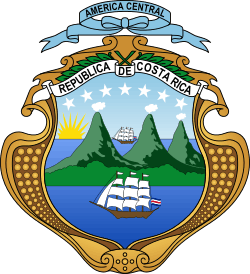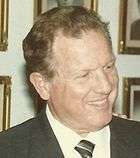Costa Rican general election, 1978
| | ||||||||||||||||||||||||||||||
| ||||||||||||||||||||||||||||||
| ||||||||||||||||||||||||||||||
| ||||||||||||||||||||||||||||||
 |
| This article is part of a series on the politics and government of Costa Rica |
|
Legislature
|
|
Judiciary |
|
General elections were held in Costa Rica on February 5, 1978.[1] Rodrigo Carazo Odio of the Unity Coalition won the presidential election, whilst his party also won the parliamentary election. Voter turnout was 81%.[2]
Carazo, former Congressman and former member of National Liberation Party (probably Costa Rica’s main political force) left the party several years before and created his own: Democratic Renovation, but a deeply split opposition on the 1974 election caused PLN’s easy victory. With that in mind, main leaders of the non-Marxist opposition started talks in order to present a unified candidature.[3][4]
Eventually these talks came through and the main parties in the opposition at the right of the government achieved an agreement; going into a primary election to chose the common nominee. Rodrigo Carazo faced wealthy industrial Miguel Barzuna winning by small margin. Even when some leaders left the coalition after this (most notably Jorge Gonzalez Marten from the National Independent Party and former president Mario Echandi) most of the leadership remained united.[5] The Unity Coalition was created out of the joining of four parties: Carazo’s Democratic Renovation, former president José Joaquín Trejos’ People’s Union, Rafael Calderón Fournier (son of Calderonist leader Rafael Calderón Guardia) Republican Party and Dr. Jorge Arturo Monge’s Christian Democratic Party (the smallest one of the coalition but the most ideologically coherent).[6]
The Left also made a Coalition; the three main far-left parties at the Left of PLN; Popular Vanguard, Costa Rican Socialist Party and Revolutionary People’s Movement made the United People coalition,[7] nominating former PLN member and doctor Rodrigo Gutierrez. Gutierrez had no possibilities to be president but the coalition did help the Left having a higher voting than usual and a large group in Congress. For many historians this election marks the beginning of Costa Rica's two-party system.[8]
President
| Candidate | Party | Votes | % |
|---|---|---|---|
| Rodrigo Carazo Odio | Unity Coalition | 419,824 | 50.5 |
| Luis Alberto Monge | National Liberation Party | 364,285 | 43.8 |
| Rodrigo Gutiérrez Sáenz | United People | 22,740 | 2.7 |
| Guillermo Villalobos Arce | National Unification Party | 13,666 | 1.6 |
| Gerdo Villalobos Garita | Democratic Party | 3,822 | 0.5 |
| Jorge Gonzáles Martén | National Independent Party | 3,323 | 0.5 |
| Carlos Coronado Vargas | Workers' Socialist Organisation | 1,868 | 0.2 |
| Rodrigo Cordero Víquez | Democratic Party | 1,613 | 0.2 |
| Invalid/blank votes | 29,065 | - | |
| Total | 860,206 | 100 | |
| Source: Nohlen | |||
Parliament
| Party | Votes | % | Seats | +/- |
|---|---|---|---|---|
| Social Christian Unity Party | 356,215 | 43.4 | 27 | New |
| National Liberation Party | 318,904 | 38.9 | 25 | -2 |
| United People | 62,865 | 7.7 | 3 | New |
| National Unification Party | 25,824 | 3.1 | 0 | -16 |
| Costa Rican People's Front | 12,834 | 1.5 | 1 | +1 |
| Republican Union | 8,215 | 1.0 | 0 | New |
| Cartago Agrarian Union Party | 7,887 | 1.0 | 1 | 0 |
| National Independent Movement | 6,673 | 0.8 | 0 | New |
| Independent Party | 5,774 | 0.7 | 0 | 0 |
| Workers' Socialist Organisation | 4,059 | 0.5 | 0 | New |
| Democratic Party | 3,083 | 0.4 | 0 | 0 |
| Limonese Authentic Party | 2,954 | 0.4 | 0 | New |
| Costa Rican Concord Party | 2,542 | 0.3 | 0 | New |
| Partido Auténtico Puntarenense | 1,759 | 0.2 | 0 | New |
| National Labour Party | 1,002 | 0.1 | 0 | New |
| Invalid/blank votes | 39,328 | - | - | - |
| Total | 859,888 | 100 | 57 | 0 |
| Source: Nohlen | ||||
References
- ↑ Nohlen, D (2005) Elections in the Americas: A data handbook, Volume I, p155 ISBN 978-0-19-928357-6
- ↑ Nohlen, p157
- ↑ Casas, Kevin. [Paying for Democracy: Political Finance and State Funding for Parties Paying for Democracy: Political Finance and State Funding for Parties] Check
|url=value (help). Retrieved 16 August 2016. - ↑ "Elections and Events 1948-1986 1948". The Library. Retrieved 16 August 2016.
- ↑ Lentz, Harris M. Heads of States and Governments Since 1945. Routledge. Retrieved 16 August 2016.
- ↑ Lehoucq, Fabrice. The Politics of Modern Central America. Retrieved 16 August 2016.
- ↑ Ameringer, Charles D. Political Parties of the Americas, 1980s to 1990s. Retrieved 16 August 2016.
- ↑ White, Stephen; Webb, Paul. Party Politics in New Democracies. Oxford University Press. Retrieved 16 August 2016.

.jpg)